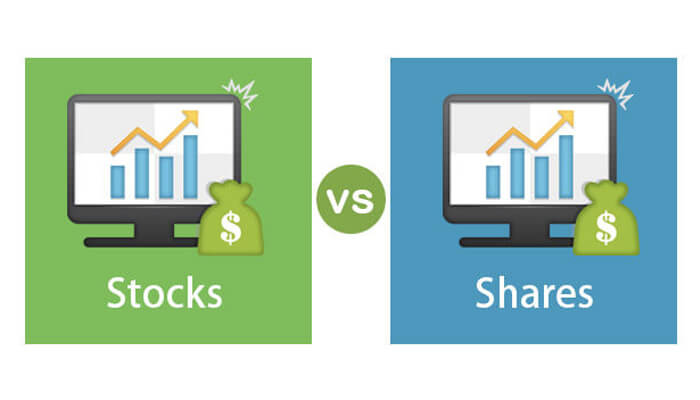Beginners and experts who know how to trade stock use stocks vs. shares interchangeably. That’s not wrong but did you know they mean different things too? Again, it’s no surprise, as stocks and shares are synonymous in American English.
However, before learning how to trade stock, you must know the difference between stocks and shares in stock trading. In this article, we’ll define what stocks and shares are and explain what makes them different from each other.
Table of Content
- What are Shares in Stock Trading?
- Difference Between Stocks and Shares Explained (With Examples)
- Three Ways to Start Trading Stock
What are Shares in Stock Trading?
Shares in stock trading refer to a fraction of a company that can be owned. Shares are divided into two types, namely, public and private. Public shares are available and listed on stock exchange markets, where individuals can purchase company parts without roadblocks.
On the other hand, private shares are not listed on the stock exchange for the general public to buy or sell as the establishment is a private company. Moreover, companies sell their private shares confidentially, which makes it difficult for external individuals to purchase such shares.
Nevertheless, private companies can decide to switch from being private to wholly or partly public companies, transforming some or all of their private shares into public shares. This action can help ordinary people buy stocks and easily engage in stock trading with those public shares.
What are Stocks in Stock Trading?
Stock is a term signifying shares in several companies, not just one specific company. It can also generally speak of shares within a particular company. In addition, stock trading professionals and experts frequently use the term stocks when referencing publicly traded companies’ shares.
Stocks can be oil stocks, cocoa stocks, gold stocks, or silver stocks, all referring to shares belonging to oil companies, cocoa companies, gold companies, and silver companies. In all these examples, the shares were grouped as a whole, not as individual companies.
Difference Between Stocks and Shares Explained (With Examples)
In a nutshell, the difference between these two stock trading terms lies in their context. Shares refer to a fraction of a specific company, while stocks refer to any company in general. Let’s look at an example.
- Louise likes to buy shares in Coca-Cola (specifically)
- Janet just bought some stocks yesterday (generally)
Furthermore, knowing the difference could even be instinctive. For example, when someone buys shares, your default response could be to ask, “in which company?” and “how many?”.
On the other hand, when anyone says they’ve bought stocks, you may hesitate to ask which company. So instead, you’ll want to know how many companies are in their stocks and probably how much they got them for. And if you want to go further, you’ll ask how the stocks are doing now so you may invest in them too.
Another illustration that shows the difference is this:
- You can buy shares, but you seldom hear anyone say trading shares. Instead, they say stock trading.
Here’s yet another example:
- Shares: Gary owns four Tesla shares.
- Stocks: Gary owns stock in Tesla.
In the above example, stocks were used to describe a company’s general concept of ownership, whereas shares were specific.
Going by these explanations and examples, the difference between shares and stocks is that shares refer to one company, while stocks refer to a group or cluster of shares in context. So that would make shares to be a unit of stocks.
In the end, it’s completely acceptable to use both terms interchangeably, especially when you’re just learning how to trade stock. So, now that you know the difference between stocks and shares let’s look at how to trade stocks and begin stock trading.
Three Ways to Start Stock Trading
There are three primary ways to get involved with stock trading. Two involve spending time trading, while the third option requires someone else to help you invest in the stock market.
Passive trading
Also known as individual trading, passive trading best suits those with just enough financial knowledge and time to research stock trading on the surface. With this method, you buy several stocks and hold them long-term to build your investment portfolio.
The benefit of passive trading is that it gives you time to engage in other investment activities aside from stock trading because you’re not always actively trading. That’s because once you’ve made your long-term investment choice, you would’ve picked shares that perform well.
Active trading
Unlike passive trading, active trading involves a lot of buying, selling, and keeping a close watch on the market. When you go with active stock trading, you’re dedicating your time to watching every single investment like a hawk and making quick buy or sell decisions based on short-term market movements.
While passive trading is suited for long-term trading, active trading is for achieving short-term gains. It is left to you to decide what constitutes long-term and short-term stock trading. Additionally, you may buy a group of stocks, such as the S&P500, and bet on the general performance of those stocks.
Investment bankers
Whatever stress stock traders encounter with active and passive trading, you’ll have none of it by trading with an investment banker or firm. All you have to do is give the bankers or stock brokers your funds, and in exchange for a fee, they’ll conduct all stock trading on your behalf.
The drawback to this method is that you may want complete control over your investment funds. However, the upside is that you only need basic knowledge because you’ll pay the experts to do all the heavy lifting.
Bottom Line
Many experts and beginner stock traders use stocks and shares interchangeably. However, they can mean the same thing when used in specific contexts.
However, the difference between stocks and shares is that shares refer to a particular company unit. In contrast, stocks are the general concept of ownership in one or several companies.




